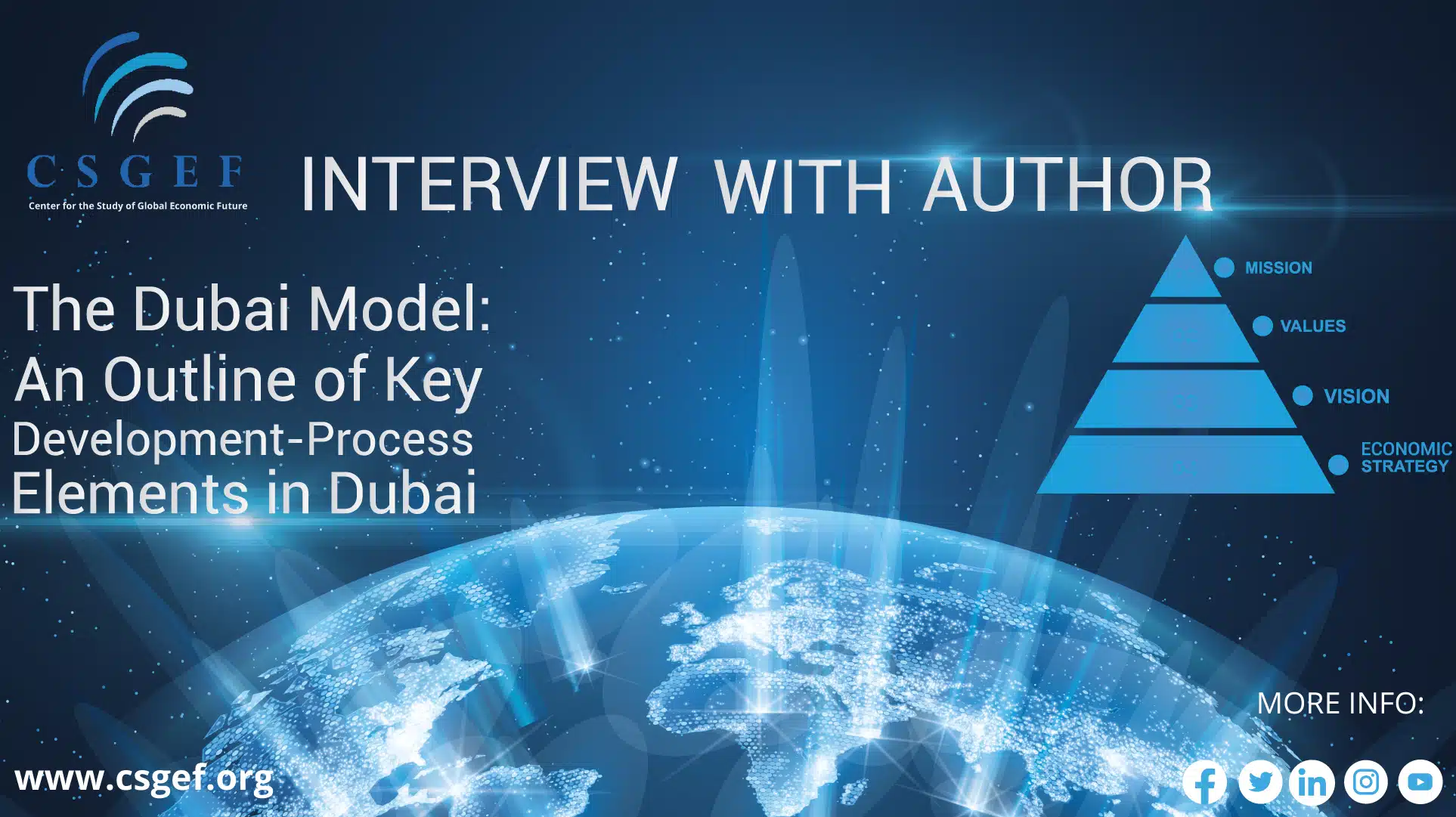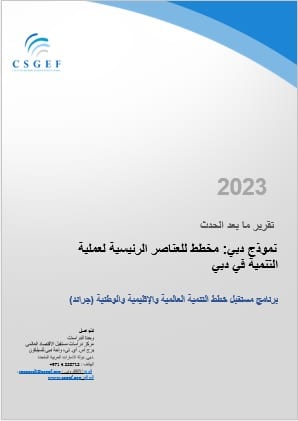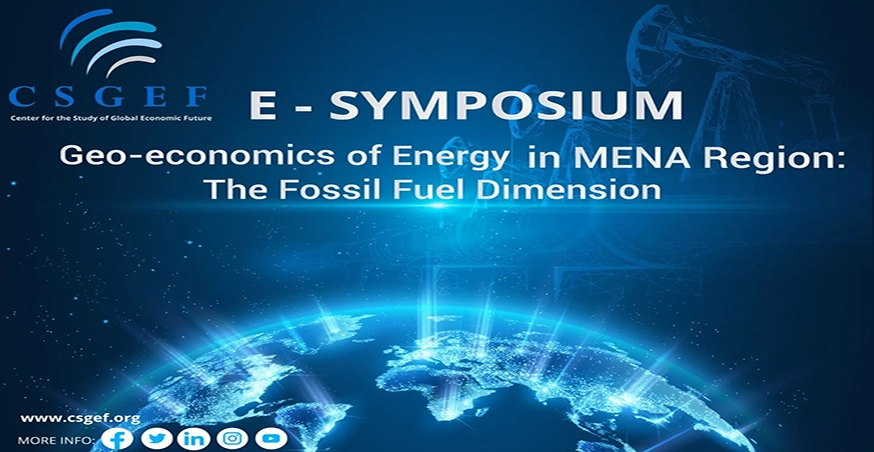The Dubai Model: AnOutline of Key Development – Process Elements in Dubai In MENA
Center For the Study of Global Economic Future (CSGEF) hosted Professor Martin Hvidt professor at the Center for Contemporary Middle East Studies, University of Southern Denmark, author of “The Dubai Model: An Outline of Key Development-Process Elements in Dubai “ during the center Interview with the Author series. Professor Martin was a Scholar at the Institute of History and Civilization, Odense University @UniSouthDenmark, and Colorado State University @ColoradoStateU. The event is an initiative of the Future of Global, Regional & National Development Plans Program (GRAND) at CSGEF.
The report provides an overview of the Dubai development model and its ripples to the MENA region. The challenges faced by MENA include climate change, economic divisions, and resource depletion. The report suggests that policymakers in the region need to adopt a new and disruptive way of perceiving ideas and transforming them into practical reality to achieve sustainable development. The importance of defining development and using a comprehensive definition that encompasses economic development, social development, and environmental protection. The Dubai model is discussed as an example of a successful development strategy, emphasizing the role of collaborative decision-making, private sector growth, and government intervention. The discussion concludes by highlighting the importance of government intervention and collaboration with the private sector for economic development in the MENA region
SESSION 1 : The Dubai Model: An Outline of Key Development-Process Elements in Dubai – Theoretical Perspective
Watch CSGEF Interview with the Author – The Dubai Model: An Outline of Key Development-Process Elements in Dubai – in which featured Interviewee Professor Martin Hvidt @mhvidt addresses the Theoretical Perspective in the Dubai Model. The event is an initiative of the Future of Global, Regional & National Development Plans Program (GRAND) at CSGEF.
Professor Martin is a Ph.D. Scholar at the Inst. of History and Civilization, Odense University @UniSouthDenmark and Colorado State University @ColoradoStateU, Head of Department, Center for Contemporary Middle East Studies, University of Southern Denmark , A World Bank Consultant , Board Member, the Association of Development Researchers in Denmark (FAU) (www.fau.dk), Chair, College committee for information technology, University of Southern Denmark, Executive committee member and Danish representative in the European Association of Development Research and Training Institutes @EADI , Member, of working group on e-science and digital humanities, University of Southern Denmark. Mahmood Sharif Mahmood , Managing Director at CSGEF led the Interview.
SESSION 2: The Dubai Model: An Outline of Key Development-Process Elements in Dubai – The Role of the Governance & State in the Dubai Model
Watch CSGEF Interview with the Author – The Dubai Model: An Outline of Key Development-Process Elements in Dubai – in which featured Interviewee Professor Martin Hvidt @mhvidt addresses the parameters of the Governance & State in the Dubai Model. The event is an initiative of the Future of Global, Regional & National Development Plans Program (GRAND) at CSGEF.
Professor Martin is a Ph.D. Scholar at the Inst. of History and Civilization, Odense University @UniSouthDenmark and Colorado State University @ColoradoStateU, Head of Department, Center for Contemporary Middle East Studies, University of Southern Denmark, A World Bank Consultant, Board Member, the Association of Development Researchers in Denmark (FAU) (www.fau.dk), Chair, College committee for information technology, University of Southern Denmark, Executive committee member and Danish representative in the European Association of Development Research and Training Institutes @EADI , Member, of working group on e-science and digital humanities, University of Southern Denmark. Mahmood Sharif Mahmood , Managing Director at CSGEF led the Interview.
SESSION 3: The Dubai Model: An Outline of Key Development-Process Elements in Dubai – Parameters of the Country’s development path
Watch CSGEF Interview with the Author – The Dubai Model: An Outline of Key Development-Process Elements in Dubai – in which featured Interviewee Professor Martin Hvidt @mhvidt addresses the Parameters of the Country’s development path. The event is an initiative of the Future of Global, Regional & National Development Plans Program (GRAND) at CSGEF.
Professor Martin is a Ph.D. Scholar at the Inst. of History and Civilization, Odense University @UniSouthDenmark and Colorado State University @ColoradoStateU, Head of Department, Center for Contemporary Middle East Studies, University of Southern Denmark, A World Bank Consultant, Board Member, the Association of Development Researchers in Denmark (FAU) (www.fau.dk), Chair, College committee for information technology, University of Southern Denmark, Executive committee member and Danish representative in the European Association of Development Research and Training Institutes @EADI , Member, of working group on e-science and digital humanities, University of Southern Denmark. Mahmood Sharif Mahmood , Managing Director at CSGEF led the Interview.
SESSION 4: The Dubai Model: An Outline of Key Development-Process Elements in Dubai – The Economic Underpinning of the Development Model.
Watch CSGEF Interview with the Author – The Dubai Model: An Outline of Key Development-Process Elements in Dubai – in which featured Interviewee Professor Martin Hvidt @mhvidt addresses the Economic Underpinning of the Development Model The event is an initiative of the Future of Global, Regional & National Development Plans Program (GRAND) at CSGEF.
Professor Martin is a Ph.D. Scholar at the Inst. of History and Civilization, Odense University @UniSouthDenmark and Colorado State University @ColoradoStateU, Head of Department, Center for Contemporary Middle East Studies, University of Southern Denmark, A World Bank Consultant, Board Member, the Association of Development Researchers in Denmark (FAU) (www.fau.dk), Chair, College committee for information technology, University of Southern Denmark, Executive committee member and Danish representative in the European Association of Development Research and Training Institutes @EADI , Member, of working group on e-science and digital humanities, University of Southern Denmark. Mahmood Sharif Mahmood , Managing Director at CSGEF led the Interview.
SESSION 5: The Dubai Model: An Outline of Key Development-Process Elements in Dubai – Sustainability of the Development Model
Watch CSGEF Interview with the Author – The Dubai Model: An Outline of Key Development-Process Elements in Dubai – in which featured Interviewee Professor Martin Hvidt @mhvidt addresses the Sustainability of the Development Model. The event is an initiative of the Future of Global, Regional & National Development Plans Program (GRAND) at CSGEF.
Professor Martin is a Ph.D. Scholar at the Inst. of History and Civilization, Odense University @UniSouthDenmark and Colorado State University @ColoradoStateU, Head of Department, Center for Contemporary Middle East Studies, University of Southern Denmark, A World Bank Consultant, Board Member, the Association of Development Researchers in Denmark (FAU) (www.fau.dk), Chair, College committee for information technology, University of Southern Denmark, Executive committee member and Danish representative in the European Association of Development Research and Training Institutes @EADI , Member, of working group on e-science and digital humanities, University of Southern Denmark. Mahmood Sharif Mahmood , Managing Director at CSGEF led the Interview.5
Post Event Summary Intro
Center For the Study of Global Economic Future (CSGEF) hosted Professor Martin Hvidt professor at the Center for Contemporary Middle East Studies, University of Southern Denmark, author of “The Dubai Model: An Outline of Key Development-Process Elements in Dubai “ during the center Interview with the Author series. Professor Martin was a Scholar at the Institute of History and Civilization, Odense University @UniSouthDenmark, and Colorado State University @ColoradoStateU. The event is an initiative of the Future of Global, Regional & National Development Plans Program (GRAND) at CSGEF.
The report provides an overview of the Dubai development model and its ripples to the MENA region. The challenges faced by MENA include climate change, economic divisions, and resource depletion. The report suggests that policymakers in the region need to adopt a new and disruptive way of perceiving ideas and transforming them into practical reality to achieve sustainable development. The importance of defining development and using a comprehensive definition that encompasses economic development, social development, and environmental protection. The Dubai model is discussed as an example of a successful development strategy, emphasizing the role of collaborative decision-making, private sector growth, and government intervention. The discussion concludes by highlighting the importance of government intervention and collaboration with the private sector for economic development in the MENA region
استضاف مركز دراسات مستقبل الاقتصاد العالمي الدكتور مارتن هفيدت، البرفسور في مركز دراسات الشرق الأوسط المعاصرة، في جامعة جنوب الدانمارك في الدانمارك ، ومؤلف “مخطط تفصيلي لعناصر عملية التطوير الرئيسية في دبي. تمت مقابلة الدكتور مارتن كجزء من برنامج “مقابلة مع مؤلف” – احدى مبادرات برنامج مستقبل خطط التنمية العالمية والإقليمية والوطنية (جراند).
ويقدم التقرير لمحة عامة عن نموذج دبي التنموي وتداعياته على منطقة الشرق الأوسط وشمال إفريقيا. حيث تتضمن التحديات التي تواجهها منطقة الشرق الأوسط وشمال أفريقيا، التغيير المناخي والانقسامات الاقتصادية ونضوب الموارد. ويشير التقرير إلى أن صانعي السياسات في المنطقة بحاجة إلى اعتماد طريقة جديدة ومبتكرة وتحويلها إلى واقع عملي لتحقيق التنمية المستدامة. ويشدد التقرير على أهمية تعريف التنمية واستخدام تعريف شامل يشمل التنمية الاقتصادية والاجتماعية وحماية البيئة. ويناقش التقرير نموذج دبي كمثال على استراتيجية التنمية الناجحة، مع التركيز على دور التكاتف في صنع القرار، ونمو القطاع الخاص، والتدخل الحكومي. ويُختتم التقرير بتسليط الضوء على أهمية التدخل الحكومي والتعاون مع القطاع الخاص من أجل التنمية الاقتصادية في منطقة الشرق الأوسط وشمال أفريقيا.
شاهد مقابلة CSGEF مع المؤلف – نموذج دبي: مخطط تفصيلي لعناصر عملية التطوير الرئيسية في دبي – والتي ظهر فيها البروفيسور مارتن هفيدتmhvidt يتناول الأسس النظرية لـ “نموذج دبي”. البروفيسور مارتن كان باحثا في معهد التاريخ والحضارة ، جامعة أودنس وجامعة جنوب الدنمارك







